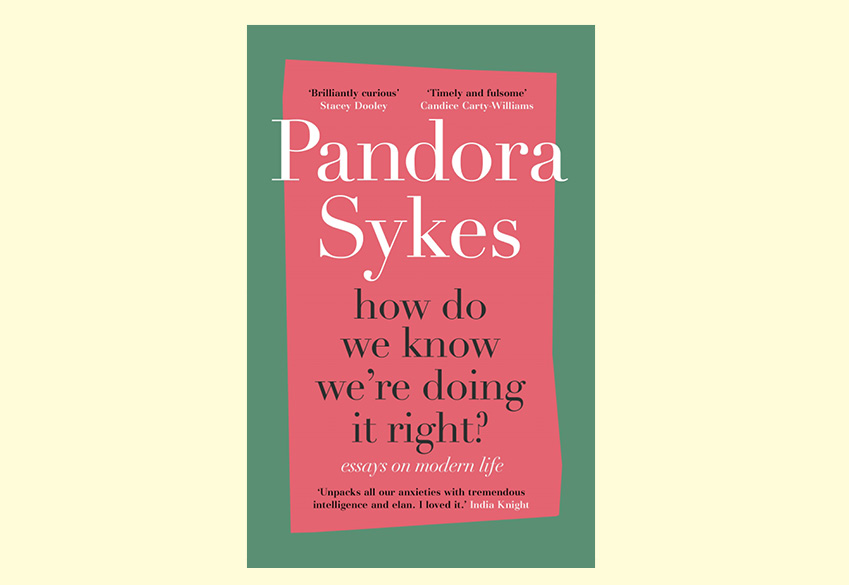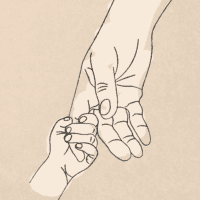I am ridiculously sensitive. Some would say laughably so. Not just about anything happening to those I love, or animals being tortured, or global tragedies – all standard fare for even the moderately sensitive person – but about entirely nonsensical things.
I ache when I see a picture of a pensioner, even if they are in the news for something horrible, because I imagine them standing pathetically in their underwear with flesh like a melted candle. I ache when I read a blind-date column and one person is like an enthusiastic puppy, excited for date number two, while the other drily notes, ‘I was relieved he didn’t ask for my number.’ (The Guardian Blind Date column, February 2019 – still thinking about it.) I even once felt the ache at Cancun airport, after my husband said it was his least favourite airport and I felt sorry for the airport, as though it had ears. I am, in short, extraordinarily and irrationally soft.
We all are now. And in ways that go far beyond a mere personality trait, leaving us stymied and stultified, incapable of moving through the world without an emotional-support peacock. The millennial ‘snowflake’ has become a narrative myth for my generation, leaned upon by conservative thinkers. (Never mind that Fight Club author Chuck Palahniuk, who invented the term, didn’t actually intend it as a pejorative description.)
The millennial ‘snowflake’ has become a narrative myth for my generation, leaned upon by conservative thinkers
Famously dubbed ‘Generation Wuss’ by the provocative writer Brett Easton Ellis, snowflakes demand safe spaces and trigger warnings and echo chambers hooked up to 5G, to lie inside of and suck our thumbs while listening to a lullaby of our own opinions. We need our botties wiped and our minds soothed. We are furious, coddled, traumatised, triggered – sometimes all at the same time.
There are real issues behind these clichés, which the conservative brouhaha and clarion calls for ‘free speech’ frequently distract from. If women need trigger warnings before rape scenes on television, perhaps we should look at why so few rapists are convicted? If women, particularly women of colour and trans women, need safe spaces, maybe we ought to consider why they feel so unsafe in public places?
If, like me, you are privileged enough not require safe spaces or trigger warnings, it does not mean that you should dismiss them, like a man who will never need an abortion but is nevertheless vehemently against them. And yet, leaving tiresome stereotypes aside, I have always wondered about how my generation’s sensitivity compares to that of previous generations – if only because I am so much more sensitive than my stoical mother, whom I have never even seen cry.
If, like me, you are privileged enough not require safe spaces or trigger warnings, it does not mean that you should dismiss them.
But when I conduct a poll via Twitter – which, to be clear, is not a scientifically accurate study – and 4,600 millennial women reply, the result is extremely close: 51.1 per cent say they are more sensitive than their mother, compared to the 48.9 per cent who say they are less.
On seeing this result and reading the hundreds of responses, each perceiving sensitivity in a slightly different way, I realise there is a clear difference between sensitivity and emotional expression – and it is confusion over the two that has seen our generation clubbed with this unfounded myth.
We are outwardly more sensitive to perceived injustice, to unwoke language, to disparity – and we certainly aren’t afraid to express our emotions in public. But we are inwardly resilient. The facts speak for themselves. We take fewer sick days, we work longer hours and, despite this, millennial parents spend more time with their children than their parents did. Fragile, you say? Okay, boomer.
The truth is that we became adults as the fabric of civilised society, of civilised conversation, began to tear. For the past decade, we have been surrounded by disorientating social-media platforms, a flammable political climate, soaring house prices and job precarity. The result is a sense of unbearable insecurity – which has changed not only the way we live and value our lives, but also how we talk about them.
The truth is that we became adults as the fabric of civilised society, of civilised conversation, began to tear.
With over 264 million people globally now suffering from some sort of anxiety disorder (and it is a significantly higher proportion of women) our collective sentiment is like a giant raw nerve.
A raw nerve is when damaged nerves transmit the wrong signal to the brain: it feels like being stung by a hundred bees, pricked by a thousand needles or slashed with shards of glass. It is not just something that manifests in the individual. Rather, the raw nerve has become a cultural psychosis.
The phrase all the feels is shorthand for being overcome with feelings (often contradictory ones). Like many internet-born colloquialisms, all the feels has an unnerving subtext: we are suffused in feelings that obliterate our rational judgement.
In his book Nervous States: How Feeling Took Over The World, the political economist William Davies dissects when and how we became one great big feeling. Short answer: technology. Digital platforms not only encourage us to emote, they depend on it for revenue.
In today’s digital world, there is no longer any scope to pause and take a breath. Evidence takes too long; emotion is instant. The way we talk online has filtered down to the way we talk offline, so that internet rhetoric colours all of our dialogue and has spread like a contagion. We have become, writes Davies, ‘a vast neural network through which sentiment travels from body to body, at ultra-high speed.’ We no longer experience feelings. We are our feelings.
In today’s digital world, there is no longer any scope to pause and take a breath. Evidence takes too long; emotion is instant
Most of us only started to use social media around 2010, but feelings began to replace reason more than a decade earlier. Princess Diana’s death in 1997 was a huge turning point.
Her passing unleashed an unprecedented torrent of public grief (and politicians took note). People sobbed in the streets in their thousands. ‘It would be idle to attribute this cultural shift entirely to the influence of a single, deceased member of the royal family,’ writes Matthew d’Ancona, ‘but the impassioned aftermath of her death was a bold punctuation mark in a new national narrative that favoured disinhibition, empathy and personal candour.’
Diana herself was a woman governed by her emotions. She ‘legitimised the role of feeling in the public space’, writes d’Ancona: speaking about her bulimia, shaking the hand of an AIDS patient in 1989, that ‘there were three of us in this marriage’ Panorama interview with Martin Bashir. Diana traded in feelings – they were her legacy.
The general consensus is that if we could all be a bit more empathetic, the world would be a happier, fairer place. Barack Obama famously said in 2015, ‘The biggest deficit that we have in our society and in the world right now is an empathy deficit.’
But I don’t think that’s quite correct. Empathy means putting yourself in someone else’s shoes – and isn’t that exactly the problem? We are constantly putting ourselves in each other’s shoes, claustrophobically inhabiting one another’s every opinion and experience and weighing them to determine their validity, jostling together like sardines as we choke on everyone else’s feelings. We are so absorbed in one another’s inner intimacies that we have become incapable of rational thought.

In his provocatively titled and persuasive book, Against Empathy, the psychologist Paul Bloom argues that empathy has become a misused buzzword. It has transformed into a catch-all term for ‘everything good, as a synonym for morality and kindness and compassion’, he writes. It is frequently mistaken for sympathy, which means aligning yourself with someone’s suffering (not inhabiting it).
While empathy is an important part of our emotional catalogue, as a decision-making tool it is short-sighted, corrosive and insensitive. I am convinced that an overemphasis on empathy, especially when it is to the detriment of other emotional philosophies, is a root cause of the raw nerve.
There are three reasons why. Firstly, empathy is tribalistic. It is infinitely easier to put yourself in the shoes of someone similar to you – which often means, given the balance of power, that those who are already privileged benefit.
Secondly, empathy on any kind of large scale is impossible. You can ‘intellectually value’ multiple people, writes Bloom, but you cannot emotionally be in more than one pair of shoes at once. Go on, try it. As Annie Dillard puts it, ‘There are 1,198,500,000 people alive now in China. To get a feel for what this means, simply take yourself – in all your singularity, importance, complexity and love – and multiply by 1,198,500,000. See? Nothing to it.’
Thirdly, and I think most importantly, empathy is irrational. This is particularly dangerous in medicine, where putting yourself in the shoes of a patient or their family could mean making an unethical decision that goes against medical advice. Bloom uses therapists as an example. If you visited a therapist in a complete tizz, would you want them mirroring your anxiety – or would you want them to sympathise while remaining calm and dispensing rational advice?
Empathy can compel us to act, but not always in rational ways. Instead of empathy, Bloom calls for radical compassion. Compassion is objective and allows decisions to be made with a level of remove, rather than from within the eye of the storm. I can think of nothing the raw nerve needs more right now.
It is our preoccupation with empathy that has seen us trying to centre ourselves in every narrative and every conversation: to be in the right pair of shoes and on the right side of debate.
It is our preoccupation with empathy that has seen us trying to centre ourselves in every narrative and every conversation:
It’s absolutely exhausting, and has resulted in what James Mumford, in his book Vexed, calls ‘package-deal’ opinions. It has split us into political and cultural tribes, where you must stay in your lane or risk rejection. To dissent is terrifying. To disagree is to be morally wrong and risk cancellation. It has got to the point where many people are scared to express their point of view in case they are publically shamed for not staying within the ‘package’ of ideas ascribed to them. This is deeply restrictive and blocks progress.
Distilling ourselves into every cause and every conversation renders them meaningless. You can be annoyed by someone or something without feeling duty-bound to express it.
It sounds obvious and yet it seems like we’ve forgotten it’s possible. Those of you without Twitter might think you’re exempt from this hellscape. My friend, you are wrong. The beast has made its way into all forms of culture, so that we see it on television, in the pub, in our politics.
We don’t pause or reflect. We listen in order to respond – not to learn. The most radical answer, says Davies, would be to slow down. I think the most revolutionary thing we could do is to say: I don’t have an opinion. But I’d love to hear yours.
This is an extract from Pandora Sykes’ book ‘How Do We Know We’re Doing It Right?’ (Penguin)










1 Comment